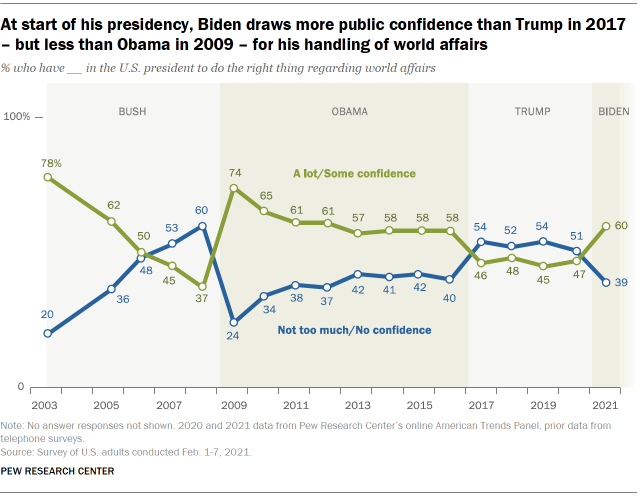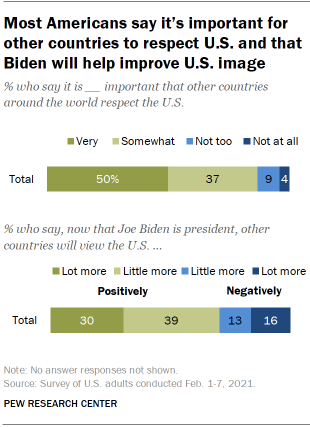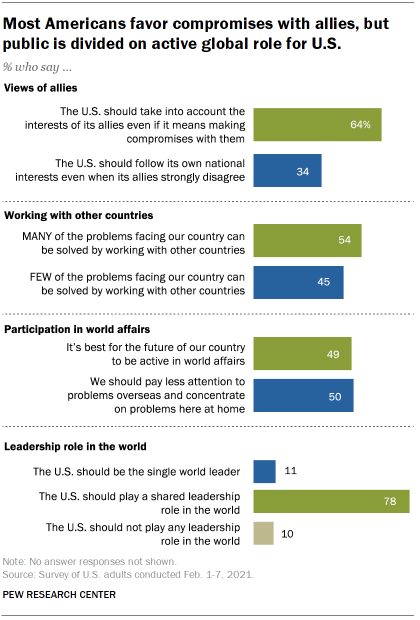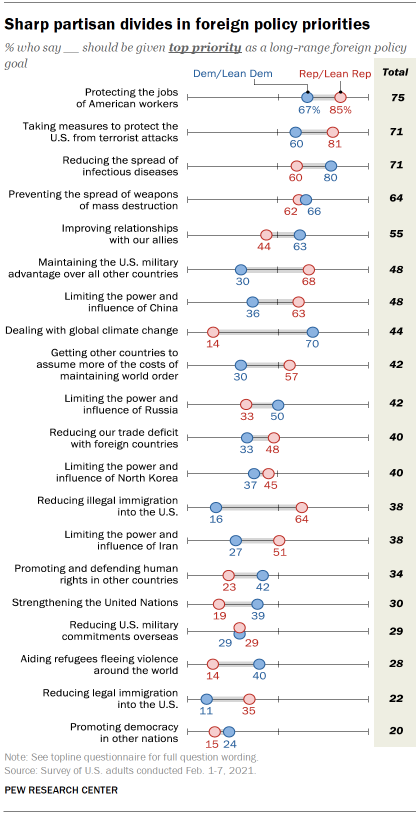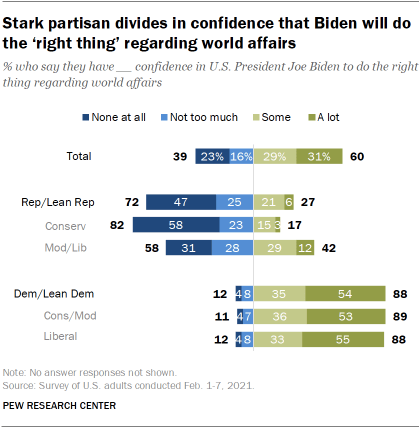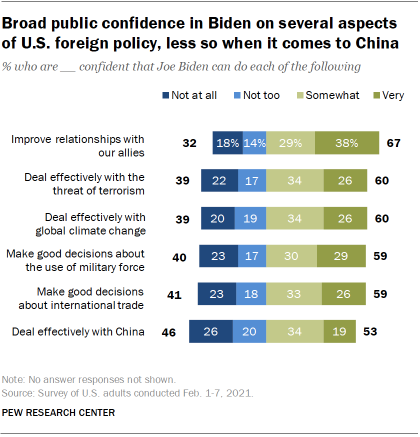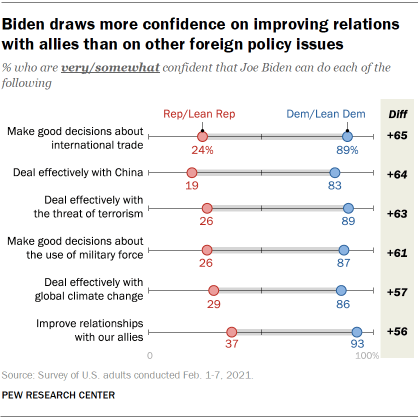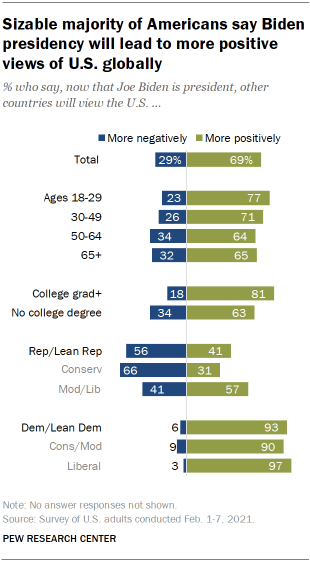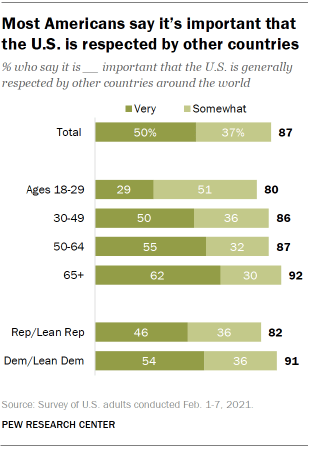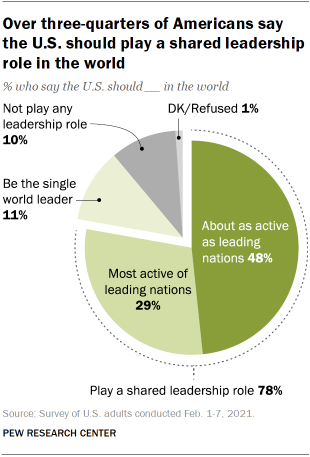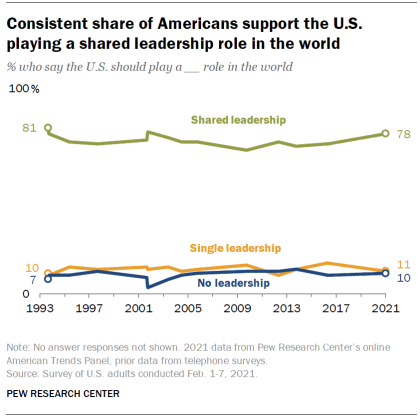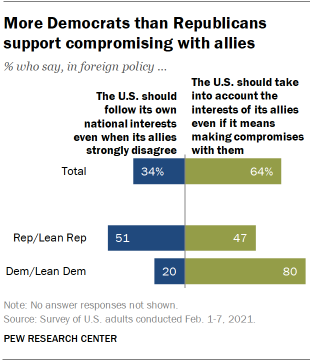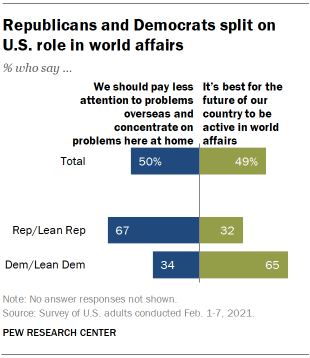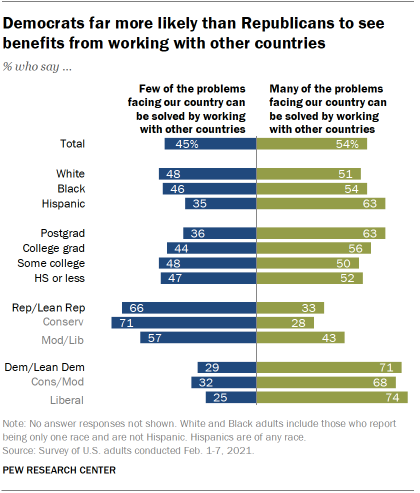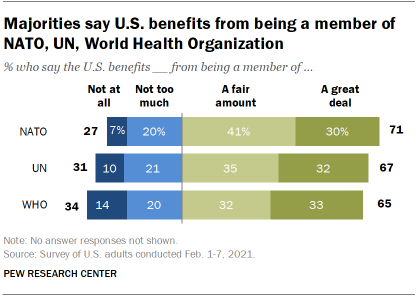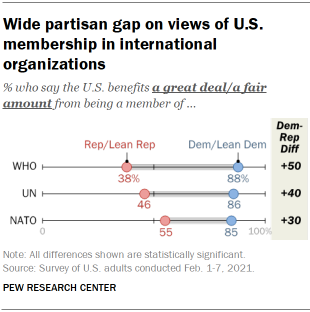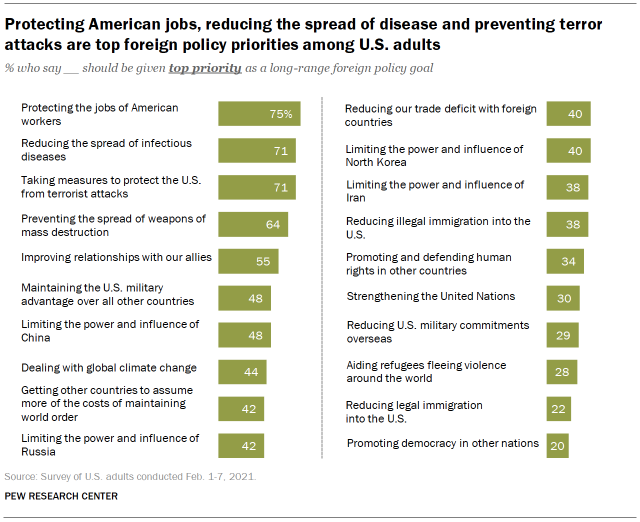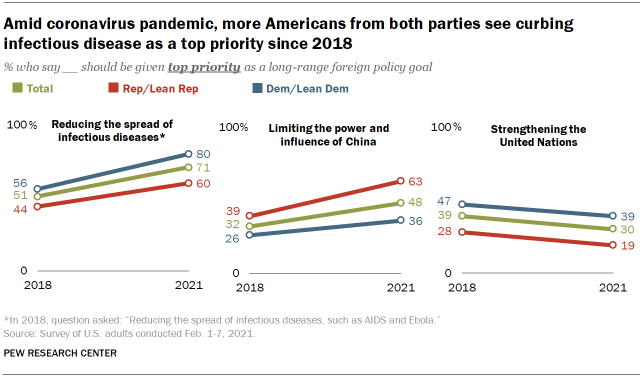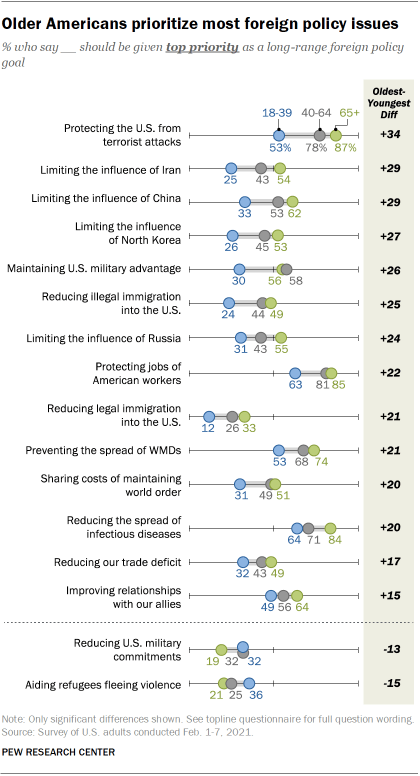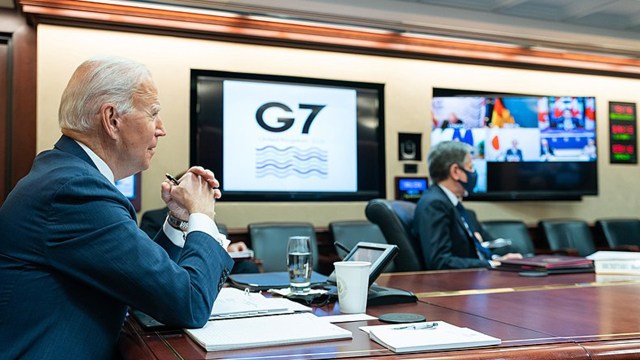
Pew Research Center conducted this study to understand American views of confidence in U.S. President Joe Biden to do the right thing regarding world affairs and of general U.S. foreign policy attitudes. For this analysis, we surveyed 2,596 U.S. adults from Feb. 1 to 7, 2021. Everyone who took part in this survey is a member of the Center’s American Trends Panel (ATP), an online survey panel that is recruited through national, random sampling of residential addresses. This way nearly all U.S. adults have a chance of selection. The survey is weighted to be representative of the U.S. adult population by gender, race, ethnicity, partisan affiliation, education and other categories. Read more about the ATP’s methodology.
While Pew Research Center has been tracking confidence in the U.S. president and views of multilateralism since 2003, prior to 2020, most of this work was done using nationally representative phone surveys. As a result, some longstanding trends may not appear in this report. Here are the questions used for the report, along with responses and survey methodology.
President Joe Biden begins his term with a majority of Americans having confidence in his ability to handle international affairs. In a new Pew Research Center survey, 60% of U.S. adults have confidence in Biden on foreign policy – fewer than said the same of Barack Obama as his presidency began (74%) but more than for Donald Trump in his first year (46%).
But the sharp partisan divides in views of the presidential election and its aftermath are also reflected in attitudes about U.S. foreign policy, particularly Biden’s handling of world affairs. Nearly nine-in-ten Democrats and Democratic-leaning independents (88%) express confidence in Biden’s ability to handle foreign affairs, compared with only 27% of Republicans and Republican leaners. Just 17% of conservative Republicans say they have confidence in Biden’s handling of foreign policy. Among moderate and liberal Republicans, 42% say this. Conservative and moderate Democrats are about as confident in Biden’s foreign affairs ability as are liberal Democrats.
Large majorities of Americans say it is important that the United States is respected around the world (87% say it is very or somewhat important) and that Biden’s leadership will result in other countries viewing America more positively (69% say this). A recent Center survey in France, Germany and the United Kingdom demonstrates how Biden’s election has improved America’s standing among those European allies after a sharp downturn during the Trump administration. Younger Americans are less willing than older adults to say it is important the U.S. is respected by other countries.
Nearly two-thirds of Americans or more also say the U.S. benefits a great deal or a fair amount from being a member of international bodies such as NATO, the United Nations and the World Health Organization (WHO), the latter of which the U.S. just rejoined under the Biden administration. More than eight-in-ten Democrats see benefits in membership for each organization. But only 38% of Republicans say the U.S. benefits by being a member of the WHO, with 46% saying the same about the UN, even as more Republicans say a NATO membership benefits the country (55%).
As to America’s role in the world, there is broad support among the public for working closely with U.S. allies. Nearly two-thirds (64%) say that the U.S. should consider the interests of other countries, even if it means compromising. Only 34% say the U.S. should follow its own interests, even when allies disagree. Americans expressed similar levels of support for working with other countries in 2018 and 2019.
In addition, 78% of Americans say they want to see the U.S. share a leadership role in the world, while only around one-in-ten want the U.S. to either be the single world leader or not play any leadership role at all. Those who favor shared leadership were asked if the U.S. should be the most active of leading nations, or about as active as others. A majority of this group (or 48% of the overall public) wants the U.S. to be about as active as other leading nations; 29% say the U.S. should be the most active. This figure has remained relatively steady over the past three decades.
But there is less consensus on the efficacy of multilateral order and whether the U.S. should be more involved in foreign affairs with so many dire problems at home. A slim majority of Americans say many of the problems facing the country can be solved by working with other countries (54%), compared with 45% who say few problems can be solved this way. Half of Americans want to pay less attention to problems overseas and concentrate on problems at home, while 49% say it is best for the country’s future to be active in world affairs.
Compared with Republicans, Democrats are more likely to favor working with other countries and being active in world affairs. And young Americans (ages 18 to 29) are more likely than older Americans to prefer considering the interests of allies and to say that the U.S. can solve many problems by working with other countries. But older Americans are generally more likely to want to be active in foreign affairs compared with younger Americans.
The American public’s top foreign policy priorities are focused on key issues facing the nation, including protecting the jobs of American workers, reducing the spread of infectious diseases like the coronavirus and protecting the nation from terrorist attacks. A further 55% say improving relationships with allies, a major Biden administration goal, should be a top priority.
Fewer than a third of Americans see strengthening the United Nations, aiding refugees, reducing military commitments overseas or promoting democracy abroad as top priorities. Since 2018, Americans have become more concerned about the spread of disease and limiting the power and influence of China but less concerned about strengthening the UN.
Across most of the foreign policy priorities tested, older Americans are more likely than young people to name each issue as a top priority. Republicans are far more likely to prioritize jobs, fighting terrorism and maintaining a U.S. military advantage over other countries. Democrats, meanwhile, are more focused on the reducing the spread of infectious diseases, such as COVID-19, and dealing with global climate change.
On Biden’s handling of specific policies, Americans express more confidence in his ability to improve relationships with allies (67% have a lot or some confidence) than in his ability to deal effectively with China (53% confident). Around six-in-ten support Biden’s ability to handle the threat of terrorism, make decisions on the use of military force, deal with climate change and make good decisions about international trade.
These are among the findings of a new survey conducted by Pew Research Center on the Center’s nationally representative American Trends Panel among 2,596 adults from Feb. 1-7, 2021.
As Biden presidency begins, Americans broadly express confidence in his ability to handle world affairs
Overall, a 60% majority of Americans express confidence in U.S. President Joe Biden to do the right thing when it comes to world affairs. A smaller share (39%) say they are not confident he will do the right thing when it comes to international issues. However, partisans are far apart in their views of Biden’s abilities on the world stage.
A large majority of Republicans and Republican leaners say they are not confident that Biden will do the right thing on the international stage: 72% say they lack confidence, including nearly half who say they have no confidence at all (47%).
And while Republicans across the ideological spectrum say they lack confidence in Biden, an overwhelming majority of conservative Republicans say this (82%), while moderate and liberal Republicans are slightly more divided: About six-in-ten (58%) say they do not have confidence in Biden, while about four-in-ten (42%) say they have at least some confidence in the new president to make the right decisions about international affairs.
As has been the case for previous presidential administrations dating back to George W. Bush, there are stark partisan gaps in confidence in the U.S. president to handle international affairs.
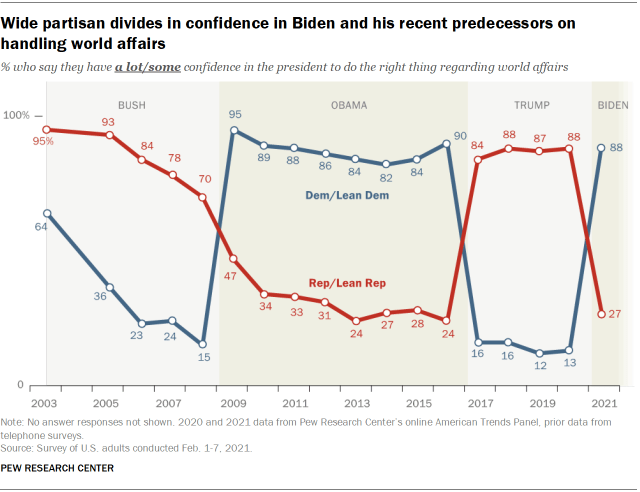
Throughout Donald Trump’s presidency, Democrats expressed low levels of confidence in him to do the right thing regarding world affairs. At the same time, Republicans were largely confident in his ability to handle foreign issues – with over eight-in-ten saying they had at least some confidence in Trump throughout his tenure.
Today, Democrats and Republicans (including those who lean to each party) express opposing views of Biden: 88% of Democrats are confident in Biden’s ability to make the right decisions about world affairs, while just 27% of Republicans say the same. Republicans’ early assessments of Biden are also slightly higher than Democrats’ views of Trump in 2017; then, 16% of Democrats said they had confidence that Trump would do the right thing regarding world affairs.
Echoing confidence in Biden’s ability to handle world affairs overall, majorities of Americans also express confidence in Biden to deal with many specific aspects of U.S. foreign policy – though some issues garner more confidence than others.
Americans express the most confidence in Biden when it comes to improving relationships between the United States and its allies: Fully 67% say they are at least somewhat confident Biden will make progress in this arena. This includes nearly four-in-ten who say they are very confident. Only about a third of U.S. adults say they are not confident Biden can do this.
About six-in-ten also say they have confidence that Biden can deal effectively with the threat of terrorism (60%), deal effectively with global climate change (60%), make good decisions about the use of military force (59%) or make good decisions about international trade (59%). About a quarter or more of adults say they are very confident he can do each.
Americans are a bit more divided on whether Biden can deal effectively with China: While just over a half of adults say they are confident (53%), 46% say they are not confident. Just 19% say they are very confident in his ability to make good decisions when it comes to China – the lowest of the six items asked about on the survey.
As was true during Trump’s presidency, partisans express significantly different levels of confidence in the president to handle various aspects of foreign policy.
Overwhelming majorities of Democrats say they are very or somewhat confident that Biden can improve relationships with allies (93%), deal effectively with the threat of terrorism (89%) or make good decisions about international trade (89%). Similar majorities also say they have confidence in Biden to make good decisions about the use of military force (87%), deal effectively with global climate change (86%) and deal effectively with China (83%).
Across all issues surveyed, Republicans express significantly less confidence in Biden. For example, there is a 65 percentage point gulf between Republicans and Democrats on Biden’s ability to make good decisions about international trade. Nearly nine-in-ten Democrats say they are confident, while just a quarter of Republicans say the same (24%).
Compared with the other issues asked about on the survey, Republicans express somewhat more confidence that Biden can improve relationships with U.S. allies (37%). This includes 10% who say they are very confident he can restore relationships. Similarly, while Biden enjoys wide-ranging confidence among Democrats to handle a number of international issues, they are most confident in his ability to repair relationships with allies: 93% of Democrats say this, including 63% who say they are very confident.
Republicans and Democrats both express the least amount of confidence that Biden can deal effectively with China. Just 19% of Republicans say he can do this, compared with 83% of Democrats – still a substantial majority, though somewhat lower ratings than for other issues.
On balance, more than twice as many Americans say countries will view the United States more positively than negatively now that Biden is president (69% vs. 29%). This includes three-in-ten who say other countries will view the U.S. a lot more positively with Biden in the White House.
There are some modest demographic divides on this question. Younger adults are more likely than older adults to say the U.S. will be viewed more positively: 77% of those under 30 years of age say the country will be seen in a more positive light, while a smaller majority of those 65 and older say the same (65%).
And while majorities of adults – regardless of their education level – say the U.S. will be viewed more positively, those with a college degree or more are considerably more likely to express this view than those with no four-year degree (81% vs. 63%, respectively).
One of the largest divides in views of Biden’s impact on the United States’ image worldwide is by partisanship. About four-in-ten Republicans say Biden’s presidency will lead to more positive views of the U.S., while a majority in the GOP say countries will view the U.S. more negatively. In contrast, Democrats overwhelmingly say Biden’s election will lead to more positive views of the U.S.
Beyond differences between Republicans and Democrats, there are sizable differences among Republicans in views of Biden’s impact on U.S. image. By a two-to-one margin, conservative Republicans are more likely to say the U.S. will be viewed more negatively (66% vs. 31%). In contrast, a small majority of moderate and liberal Republicans say the U.S. will be viewed more positively (57% more positively vs. 41% more negatively).
Democrats are nearly unanimous in their view that the United States will be viewed more positively: At least 90% of Democrats across the ideological spectrum say this.
Most adults say it is important that other countries respect the U.S.
A large majority of Americans say it is important that the U.S. is respected by other countries around the world (87%), including about half who say it is very important. Only small shares say it is not too (9%) or not at all (4%) important for other countries to respect the United States.
By and large, younger and older adults agree that it is at least somewhat important that the U.S. is respected. But there are more significant differences when it comes to the strength of importance. Overall, 50% of adults say it is very important for countries around the world to respect the U.S. Among adults younger than 30, just 29% say it is very important. This compares with half of adults ages 30 to 49, 55% of adults 50 to 64 and around six-in-ten of those 65 and older.
Overall, Democrats are slightly more likely than Republicans to say it is important that the U.S. is respected (91% vs. 82%). While 54% of Democrats say it is very important for other countries to respect the United States, a slightly smaller share of Republicans say the same (46%).
Strong support for U.S. sharing global leadership role
Americans continue to be generally supportive of the U.S. sharing a global leadership role with other countries. When asked to consider the country’s leadership role in the world, about eight-in-ten (78%) say the U.S. should play a shared leadership role. In comparison, just 11% say the U.S. should be the single world leader and 10% say the country should not play any leadership role.
Among those who say the U.S. should play a shared leadership role, people were asked whether the U.S. should be about as active or more active than other countries on the world stage. About half of the American public (48%) say they want to be as active as other leading nations, compared with 29% who say they want to be the most active in the world.
Americans’ preference for the U.S. playing a shared leadership role has remained relatively consistent since this question was first asked in a telephone survey in 1993. Similarly, the share of Americans who favor single world leadership or no leadership role at all has remained small over the past 28 years.
While majorities in both major parties support the U.S. playing a shared leadership role in the world, there are some differences along partisan lines.
Democrats and Democratic-leaning independents are more likely than Republicans and Republican-leaning independents to say the U.S. should share global leadership responsibilities (86% vs. 69%, respectively). Liberal Democrats are more likely to hold this view than conservative or moderate Democrats (90% vs. 83%). And among Republicans, about three-quarters (74%) of moderates or liberals say the U.S. should play a shared leadership role, significantly more than the 66% of conservative Republicans who say the same.
While a relatively small share of Americans say the U.S. should not play any leadership role in the world, younger adults are more likely to express this view than their older counterparts. Americans ages 18 to 29 are more likely than any other age group to say the U.S. should not have any global leadership role (16% hold this view).
Many Americans want to account for allies’ interests, but divided views on level of participation in world affairs
On decisions of foreign policy, about two-thirds (64%) of Americans say that the U.S. should take into account the interests of its allies, even if it means making compromises, while 34% say the country should follow its own national interests, even when its allies strongly disagree. The share of Americans who support taking allies’ interests into account has remained relatively stable since 2019.
Democrats are more likely than Republicans to say the U.S. should take allies’ interests into account and compromise: 80% of Democrats hold this view, compared with 47% of Republicans. Republicans are in turn more likely to favor following U.S. national interests, even when allies disagree (51% vs. 20% of Democrats).
While majorities across all age groups say the U.S. should take allies’ interests into account, even if it requires compromise, Americans ages 18 to 29 are particularly likely to say this: 74% hold this view. And those with a bachelor’s or postgraduate degree are more likely than those with less education to favor considering the interests of allies, while the opposite is true on whether the U.S. should follow its own national interests, even when allies strongly disagree.
Americans also express divided views on the level of engagement on the world stage. Half of U.S. adults say the country should pay less attention to problems overseas and concentrate on domestic problems, while 49% say it is best for the future of the U.S. to be active in world affairs. This division on U.S. participation in world affairs has been consistent over time.
Democrats are more likely to favor the U.S. being an active participant in world affairs. About two-thirds of Democrats (65%) say this, compared with about one-third (32%) of Republicans.
Adults 65 and older are more likely than all other age groups to say it’s best for the future of the U.S. to be active in world affairs (57% express this opinion).
Americans narrowly see solutions to U.S. problems through international cooperation
Americans are somewhat divided on the question of international cooperation’s ability to solve problems facing the country. Over half (54%) of U.S. adults believe many of the problems facing their country can be solved by working with other countries, compared with 45% who say few problems can be solved this way.
About six-in-ten Hispanic adults (63%) say many problems facing the U.S. can be solved by working with other countries, significantly more than the share of White adults who say the same.
Adults with more education are more likely than those with less education to say many problems can be solved by working with other countries: 63% of Americans with a postgraduate degree say international cooperation can solve many U.S. problems, compared with 52% of Americans with a high school diploma or less.
Democrats and Republicans are sharply divided on the question of international cooperation to solve problems facing the country. About seven-in-ten Democrats (71%) say that working with other countries can solve many problems facing the U.S., compared with one-third of Republicans. In contrast, 66% of Republicans say that few problems are likely to be solved by working with other countries.
Majorities of Americans are positive on membership in international organizations
Six-in-ten or more of U.S. adults say the U.S. benefits at least a fair amount from membership in NATO, the United Nations and the World Health Organization (WHO). And three-in-ten or more say the U.S. benefits a great deal from its membership in these organizations. In contrast, roughly one-third or fewer believe the U.S. does not benefit from membership in each international organization.
Previous Pew Research Center phone surveys have found that Americans have been more positive than negative toward NATO (57% favorable in 2020), the UN (62% favorable in the same year) and the WHO (53% said the organization had done a good job dealing with the coronavirus outbreak).
Democrats are much more likely than Republicans to say the U.S. benefits from membership in each international organization. For example, Democrats are 50 percentage points more likely than Republicans to say the country benefits from WHO membership (88% vs. 38%, respectively). The Biden administration recently announced that the U.S. would resume funding to the WHO, after the Trump administration ceased funding last summer.
Economic and security issues are public’s top foreign policy priorities
Americans view economic and national security issues to be among the most pressing long-range foreign policy goals in 2021. At the top of the list of the 20 foreign policy goals polled, three-quarters consider protecting American jobs as a top priority. Fighting disease and combating terror attacks came in a close second, with about seven-in-ten seeing an urgent need to address these security threats. Majorities also see limiting the spread of weapons of mass destruction and improving relationships with allies to be critically important.
By contrast, issues like promoting democracy, providing aid to refugees and supporting human rights, as well as limiting legal immigration, strengthening the UN and reducing military commitments abroad were prioritized by about a third or fewer.
Attitudes toward these foreign policy goals have remained largely stable in recent years, with a few exceptions. Most notably, the share who say limiting the spread of infectious disease is a top priority has increased by 20 percentage points since 2018, the last time the question was asked. (In 2018, the question was asked about infectious diseases, such as AIDS and Ebola.) This shift comes amid the coronavirus outbreak, which many in the U.S. and around the world say has meaningfully changed their lives. Support for prioritizing the containment of infectious disease increased among both Republicans and Democrats since 2018.
Similarly, the share who say countering China’s power should be given precedence in foreign policy has increased from about a third to roughly half since 2018. This comes as Americans and people across the globe have grown more critical of China. The increase in urgency for limiting Chinese influence was also bipartisan, but Republican prioritization increased by 24 percentage points between 2018 and 2021, while Democratic support only increased by 10 points.
On the other hand, Americans are now less likely to think bolstering the UN should be at the top of the U.S.’s foreign policy agenda, despite holding consistently positive opinions of the organization. Supporters of both parties grew less likely to prioritize a stronger UN by similar margins since 2018.
In addition, there are strong divides in how foreign policy goals are prioritized between partisans. Broadly speaking, Democrats are more likely than Republicans to see goals related to the environment, human rights and global cooperation as top priorities. The largest divides are seen in views of combating climate change, where Democrats are five times as likely as Republicans to think it should be prioritized. Seven-in-ten Democrats say climate change should be a top priority compared with 14% of Republicans. Since 2018, partisans have become even more divided, with the share of Republicans seeing an urgent need to address climate change falling by 8 percentage points.
Republicans are more likely to see more traditional security issues and limiting immigration as the foreign policy goals needing the most attention. For example, Republicans are 48 points more likely than Democrats to consider curbing illegal immigration to be a top priority and 38 points more likely to say the same about maintaining a U.S. military advantage over other countries.
Key partisan divides are also seen in how to prioritize dealing with varying foreign powers. Republicans are more likely to see limiting Iranian, Chinese and North Korean power as critical challenges, while Democrats are more likely to give precedence to curbing Russian influence.
Still, some issues don’t cleave much along partisan lines. For instance, similar shares in both camps agree that containing the spread of weapons of mass destruction should be prioritized. Additionally, only 29% in both groups see a need to reduce U.S. military commitments overseas. In 2018, 34% of Democrats considered limiting the military’s reach abroad a top priority compared with only 26% of Republicans, an 8-point difference.
There are also differences by age in attitudes toward many of these foreign policy issues. Adults 65 and older are more likely than those under 40 to see 15 of the 20 foreign policy goals polled as top priorities. For instance, among older Americans, who are also more likely to see terrorism as a major threat, the share who view protecting the U.S. from terror attacks as a top priority is 34 percentage points larger than the share of younger adults who say this. Older adults are also more supportive of prioritizing countering Iranian and Chinese influence, and also tend to be more critical of Iran and of China in general, when compared with their younger counterparts.
The only issues on which younger Americans express more urgency is providing support to refugees and limiting U.S. military commitments abroad. Those under 40 are 15 percentage points more likely than those 65 and older to consider aiding people around the world fleeing violence as a critical issue, and 13 points more likely to view reining in military commitments overseas a top priority.
